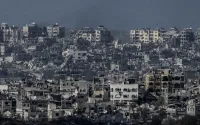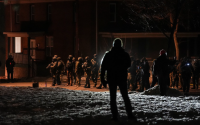31 July 2006Akiva Eldar
By the time Israel was covered with banners declaring "We will win," the enemy, Hezbollah, had already managed to declare victory. After all, for the first since the War of Independence, masses of Israelis took cover for days on end in bomb shelters and thousands of citizens tasted the bitterness of being refugees. In the summer of 1967, six days sufficed for the Israel Defense Forces to rout the armies of Egypt, Syria and Jordan. For nearly three weeks an Israeli army, much more powerful and sophisticated than its predecessors, has been unable to defeat the Lebanese militia. Hezbollah has already been calling the hard-fought battle of the village of Maroun al-Ras, Marfu al-Ras (head held high). And the killing yesterday of more than 50 civilians at Kafr Qana, most of them children, grants the group a significant victory in the struggle for international public opinion. Irrespective of when the war in the north ends, it already has claimed a place of honor in Arab victory albums, along with the Egyptian "victory" in 1973. The political leadership is beginning to grasp that even if we manage to send Hassan Nasrallah on the journey taken by Ahmed Yassin, Hezbollah (the Party of Allah), like Hamas, will not disappear from this world. Moreover, according to the plan Condoleezza Rice is carrying around, Hezbollah is expected to exit this war having extricated the Lebanese prisoners and the Shaba Farms from Israel, and still get to keep some of its arsenal. The most important return that Israel can receive for the high cost that it is paying in this war is the implementation of Security Council Resolution 1559, which calls for the Lebanese army to replace the armed militias along the northern border. However, Nasrallah is in no rush to give up his hold on southern Lebanon. According to his interpretation of the UN resolution, unaltered Hezbollah units will join the Lebanese army. With the generous help of Syria, which is not hiding the pangs of agony it feels in shaking its Lebanese addiction, Hezbollah will be able to do to the new international force that will be deployed in the south, what the Shi'ites are doing to the coalition forces in Iraq. Hezbollah may find natural partners among the soldiers of the Lebanese army (comprised in great part of Shi'ites), who have suffered lethal blows from Israel in recent weeks. The great prize for Hezbollah is in the warning stemming from the Saudi Arabian court regarding a pending expiration of the Arab peace initiative from March 2002, which offers recognition of Israel in exchange for a return to the 1967 borders. The New York Times reported over the weekend that the Saudis informed the West that as long as the U.S. is in the way while Israel destroys Lebanon and engulfs the region in flames, Saudi Arabia will not stop the war. A hint that some of the seriousness of this message was understood in Washington can be found in the demand posed to Prime Minister Olmert by Rice that the bombing of Lebanon's infrastructure cease and that Israel desist from undermining the already weak position of Prime Minister Fouad Siniora. As in the case of Palestinian Authority Chairman Mahmoud Abbas, the Americans were very late in understanding that the alternative to a weak, secular, central authority is Islamic rule or chaos. Indeed, Israel must not agree to a cease-fire that will grant Hezbollah most of its wishes. True, neighbors must understand that violence does not pay and that the solution for disputes is found in UN decisions, in international law, and in the deployment of peacekeeping forces in areas of conflict. The peace agreement with Egypt, which included the return of the Sinai peninsula, including Taba, was Israel's most important strategic gain in the past 30 years. The return of Shaba Farms as a down payment for the Golan Heights could repeat this achievement in the north. As Rice has said, there is no point in a cease-fire if it does not promise stability and merely takes us back to the situation that existed along the Lebanese border on July 12, the day of the Hezbollah attack against Israel. To really change this situation, and also defeat Hamas and isolate Iran, the U.S. must offer Syria a way to get off the list of terrorists and onto the path of diplomacy. And if we really want to win, not just on billboards and banners, we must stop shooting and start talking.
http://www.haaretz.com/hasen/objects/pages/PrintArticleEn.jhtml?itemNo=744440






